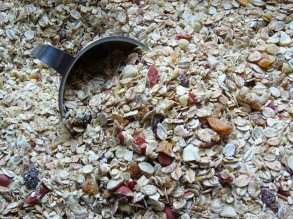Irritable Bowel Syndrome (IBS) is one of the most frustrating and confusing of digestive disorders that affects both women and men. 65% of cases are female with over 35’s being the most common age group. It is often misunderstood and misdiagnosed. It can have a huge impact on your quality of life with some people becoming virtual prisoners of the condition.
The good news is that simple things can dramatically help you! The soluble fibre in rice, potatoes, carrots and turnips is amazing and should be the cornerstone of any treatment. Drinking water is equally dramatic in its benefits. A little time out with deep breathing and a nice relaxing cup of chamomile tea can greatly help you too!
Research shows that an essential fat supplement can work wonders for you. Equally great is a probiotic supplement with one client of mine saying she felt the best in 20 years after taking this alone with no other change! Chewing food is a vital first step in the right direction and can often help you cope with foods that you feel are trigger foods. Herbal teas, especially fennel and chamomile tea provide amazing benefits too.
IBS affects a huge number of people. It is essentially the name given to a digestive disorder that exists when all other recognisable digestive disorders have been ruled out. The last point is a key one; please do not just assume that you have IBS as it shares many symptoms with other digestive disorders. It is important to rule out other conditions first with your G.P.
The symptoms of IBS can be many but lower abdominal pain and cramping, gas, constipation, diarrhea or alternating bouts of these are among the most common. Equally varied are the trigger foods that seem to affect people and this makes treating the condition all the more difficult. Colitis is the next stage progression from IBS and Diverticulitis is a step further again, so the recommendations here will help all three conditions greatly.
The real problem with IBS is that we tend to mask it over with medications, waiting for the next flare up to occur. Medications should only be used in extreme emergencies and are not a good idea in the long term. Laxatives are equally destructive and again should only be used in extreme emergencies and for the short term. The right approach is to identify and eliminate the root cause of your problem and then control any trigger foods until you have built up your digestive system to strong effective normal operation again. Here are the tips that will really make a difference to you.
Trigger Foods
The foods that trigger IBS, Colitis and Diverticulitis vary for everyone.
• Look first at wheat products, dairy products, red meats, corn and corn products.
• Then look at citrus fruits (oranges, lemons and limes), brocolli, cauliflower, brussel sprouts, spicy food like peppers and chillies, carbonated drinks, coffee and beans.
If in doubt take them all out for a while! Safe alternatives are oat based muesli, oat bran porridge, millet flakes, rice flakes, quinoa, fortified oat milk, fortified rice milk, soy milk, fruit other than the above, carrots, parsnips, turnips, chickpeas, basmati rice is amazing and chicken and fish should be fine too!
Super Nourish Your Digestive System
This is one of the most critical steps of all and helps get to the root cause of the problem. It can be your key to being able to re-introduce many of your trigger foods eventually.
• Get one good essential fat supplement with omega 3 and 6 essential fats from a combination of fish, flax and borage seeds altogether.
• Take a multi-strain probiotic supplement (friendly bacteria). Start with the equivalent of 6 to 10 billion bacteria daily and build quickly up to at least 20 billion bacteria daily after a few days.
• And my favourite – L-glutamine – this simple amino acid available from most health stores repairs multiple problems in the digestive system. It is truly amazing! Get in powder form and mix with water – it is tasteless! Follow the instructions on the package.

Fibre Is Your Friend
There is a lot of misunderstanding about fibre! You badly need fibre but focus initially on soluble fibres from apples, plums, carrots, brown rice, oat bran, linseeds and psyllium husks. Linseeds and psyllium husks can be miracle workers so pay particular attention to these. Soluble fibre is a great regular of the bowel function and will improve both constipation and diarrhea! Slowly build up your insoluble fibre too as this is very important to long term health – choose beans, peas and lentils, non wheat grains, breads and cereals e.g. couscous, quinoa, amaranth, spelt bread, rye bread, oat bran bread and rye flakes, millet flakes and barley flakes.
Control Stress
This is one of the most frequent causes of IBS. Avoiding stress is almost impossible but you can certainly learn to control it! Thankfully very life events are ‘life or death’ situations and you need to practice taking this approach to analysing problems. If its not ‘life or death’ don’t let it take over your life and put a strict limit on the time you spend worrying about it. Very helpful too is to take 5 minutes out daily and sit down, close your eyes and just focus on deep breathing and if possible listen to some calming music. One cup of chamomile tea morning and evening is also amazing for calming the nerves.

Water! Water! Water!
This is fundamental to easing IBS and preventing re-occurrence. Proper water levels are crucial for normalising bowel function. You need to drink 1L for every 100lbs you weigh and focus on drinking it between meals and not at meals as it can hinder digestive function. Please don’t underestimate the power of water for this condition.
No To Medications & Laxatives
Use of medications and laxatives is not good for IBS unless in cases of real emergency. The bottom line is they mask over the problem, do nothing to address the real cause and it will re-surface again. The more often you use these the weaker your system is getting overall. You need to take a ‘root cause’ constructive approach to solving IBS as outlined in the tips here.
Chew! Chew! Chew!
Sometimes in looking for a miracle we overlook the real miracle! Chewing your food can greatly help improve many IBS problems. Proper chewing is critical to good digestion. The more solid the food the more you need to chew. Swallowing lumps of food is the cause of much digestive irritation and food intolerance. So a little more thought about chewing and enjoying the flavour of your food will work wonders! Focus on chewing solid foods at least 10 times.
What If You Flare Up?
If you get a flare up which will be inevitable in your journey to fixing this, then eliminate all trigger foods and focus for a few days on rice dishes and soups and juices made from soluble fibres especially carrots, parsnips and turnips and apple and grape juice.
